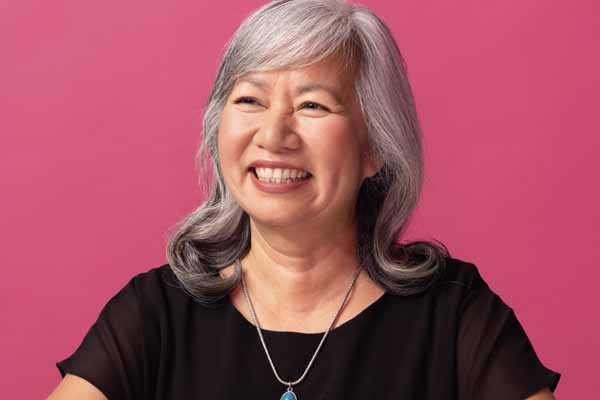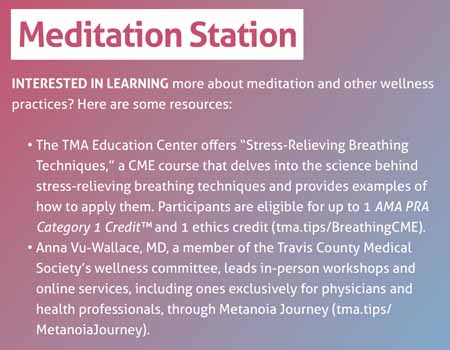
After the devastating loss of her husband and years of professional burnout, Austin internist Anna Vu-Wallace, MD, struggled to recover.
She found little solace in therapy and had no interest in medication. When a friend suggested meditation, she was skeptical. “Isn’t that for people who burn incense and smoke [marijuana]?” she remembers thinking.
But toward the end of 2009, as she juggled her responsibilities as a hospitalist and the mother of two young children, Dr. Vu-Wallace relented.
“I could not believe that it worked,” she told Texas Medicine.
And fast. Very quickly, her joy in practicing medicine returned, easing her grief and burnout.
“I found that I appreciated life,” she said. “I was in gratitude all the time.”
Nearly 15 years later, Dr. Vu-Wallace still meditates. She’s also learned about its many benefits. A 2022 study published in Frontiers of Psychology found mindfulness practice, including meditation, among physicians with burnout decreased emotional exhaustion and depersonalization while improving mood, responses to stress, vigor, self-awareness, compassion, and empathy.
Dr. Vu-Wallace’s practice has since grown to include workshops for physicians, medical students, health professionals, and members of the public.
Although clear-eyed about the limits of meditation – which can do little to reform the broken health care system – she knows from experience that it can help pave a path toward wellness.
During her workshops for physicians, she emphasizes to participants that they have a responsibility to care for themselves. When they are healthy, they are in a better position to care for their patients, their families, and their profession.
“The whole health care system is awful,” she said. “But how do we effect change if we’re injured or we’re not healing ourselves?”
In addition to meditation, Dr. Vu-Wallace encourages her fellow physicians to get involved in organized medicine, such as through their county medical society or the Texas Medical Association, which can help right more systemic wrongs, such as plummeting physician payment and crushing administrative burdens.
She also practices what she preaches.
In 2022, she co-founded Metanoia Journey, which offers in-person workshops and online services. She’s currently working with the Travis County Medical Society to develop more workshops geared especially toward physicians and health professionals. And she continues to teach a meditation class at The University of Texas at Austin Dell Medical School, which she hopes serves as a prophylactic.
“You really don’t want to create another generation of wounded healers,” she said.

Dr. Vu-Wallace knew she wanted to become a physician from a young age, a motivation that saw her through an eventful early life.
Born in Vietnam during the Vietnam War, she had migrated from the communist north to the non-communist south of the country and immigrated with her parents to the U.S. by the time she was eight years old.
“I witnessed a lot of suffering during my short eight years living in Vietnam,” she said.
By the time she arrived in Kansas, she was devoted to becoming a physician, in which role she hoped to alleviate others’ suffering. She learned English, attended college on a full scholarship, and matriculated at medical school.
When it came time for residency, Dr. Vu-Wallace chose internal medicine for its far-reaching scope.
“I wanted to be the kind of doctor that everyone looked to when a crisis hit,” she said.
Initially, she practiced independently, making house calls and caring for a patient population that included individuals who were indigent or enrolled in Medicaid. Although she loved the work, she struggled to cover her overhead costs and medical school debt. This financial predicament led her to consider other practice settings – and not for the last time.
She eventually settled in Austin, where she worked as a hospitalist for a physician-owned group.
“I loved, loved it,” she said.
In this new role, Dr. Vu-Wallace spent the vast majority of her time caring for patients. But over the next two decades, she increasingly spent less time with patients and more time attending to administrative tasks. These industry changes left her feeling less autonomous and more burned out.
In 2009, against this backdrop of professional dissatisfaction, she experienced a family tragedy when her husband died by suicide.
“That pretty much stopped me,” she said. “I didn’t know how to heal myself.”
After Dr. Vu-Wallace started meditating, she delved into research showing its myriad health benefits and realized its capacity to heal her – and others’ – professional burnout.
Through this process, she also realized how distressed she had been even before her husband’s death.
“The things that we see as physicians, 99% of the population will never see,” she said. “That’s trauma, but we don’t recognize it as trauma.”
Like countless other physicians, Dr. Vu-Wallace instead experienced emotional exhaustion and depersonalization as she contended with prior authorization hassles, successive Medicare payment cuts, and other challenges. (See “Taking the Temperature on Physician Burnout,” page 20.)
At this stage in her career, she felt undervalued by the health care system and devoid of any sense of personal accomplishment.
In addition to the personal toll, Dr. Vu-Wallace cautions that burnout can have deleterious effects on patient safety, leaving the physicians who care for them overwhelmed and compromising the quality of care provided.
But meditation was – and still is – a salve.
“I was convinced that this was part of the answer to burnout,” she said. “It certainly was for me.”
Data may agree. The authors of the aforementioned Frontiers in Psychology study found that mindfulness practice among physicians can help address burnout on an individual level as well as more systemically.
“Mindfulness practice is a quintessential component of positive psychology and is inherently linked to effective leadership,” they wrote. “A mindful and compassionate physician leader will play a crucial role in addressing current practice gaps, prioritizing staff mental health, and providing a supportive platform for innovation.”
As Dr. Vu-Wallace began to recover, she helped other physicians and health professionals share in these same benefits. She began offering workshops through local hospital systems, including what is now Ascension Seton, and Dell Medical School.
“The response has been significant,” she said.
More recently, Dr. Vu-Wallace and her second husband, minister David Wallace, founded Metanoia Journey, through which her workshops continue. (See “Meditation Station,” page 24.) Metanoia stems from Greek and means “a transformative change of heart.”
Dr. Vu-Wallace’s own healing journey continues. She is learning how to say “no” to certain events to prevent further burnout. And she still must adapt to a changing health care industry that often “feels like a machine,” she said.
Five years ago, she transitioned from hospitalist to hospice physician, a change that has deepened her sense of professional accomplishment and satisfaction.
“It’s had a huge impact, personally, on me as a physician,” she said. “Many of us in health care started that way. … But that somehow got taken away.”